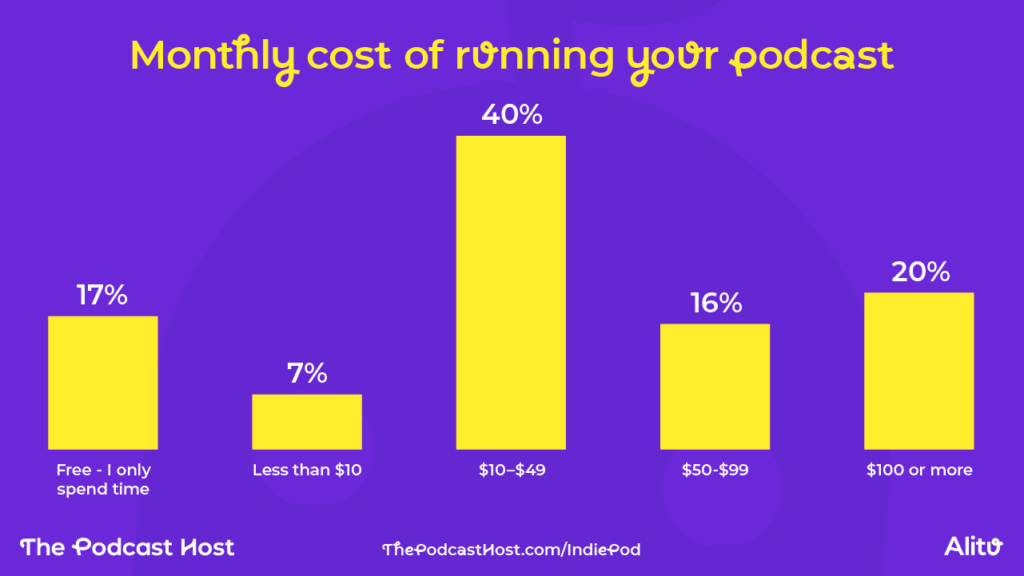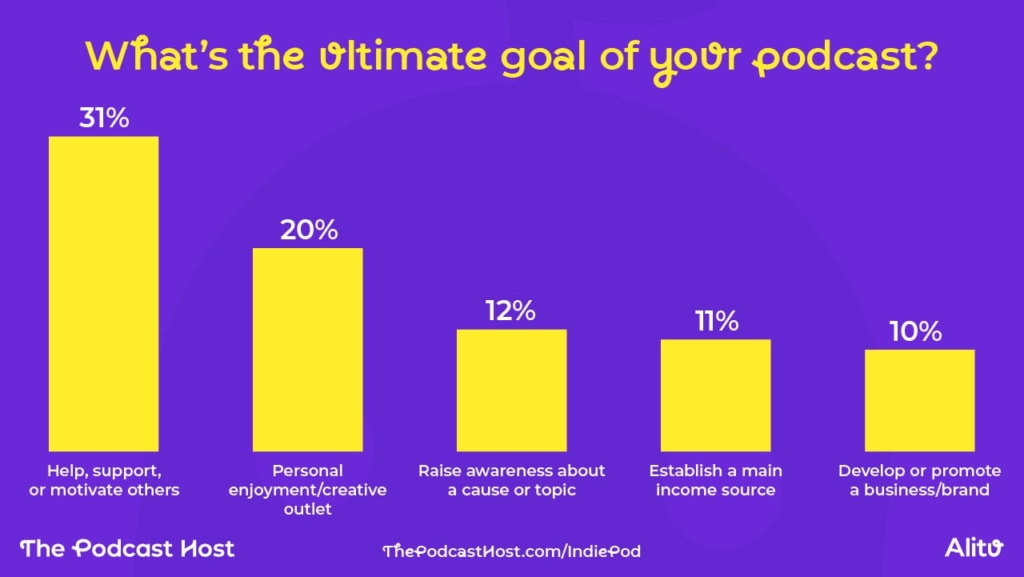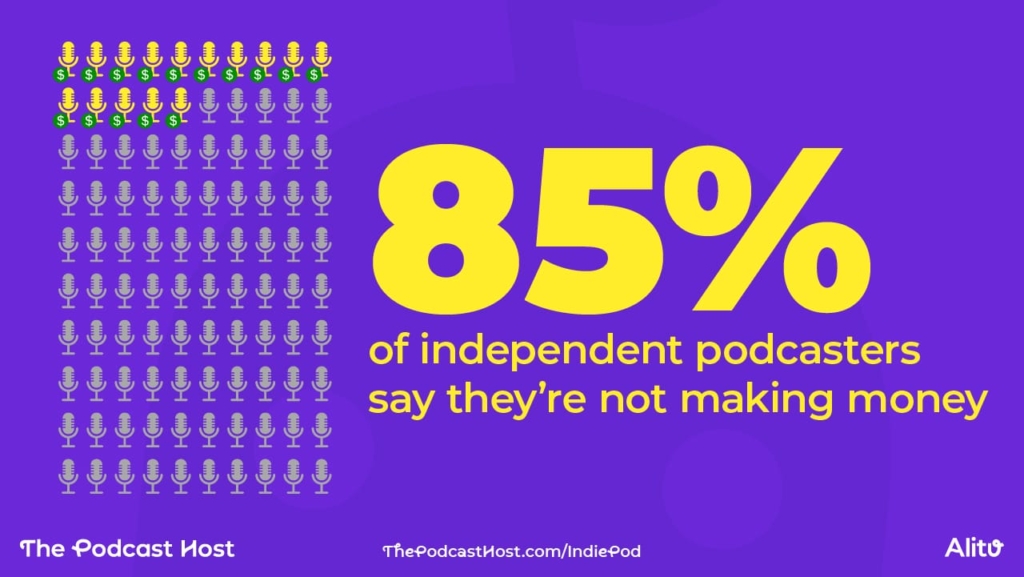Can You Run a Successful Podcast Without Spending Any Money?
One of the best things about podcasting is that anyone can make one. In theory, all you really need is access to a laptop and a great idea, and you can share your voice with the world.
So technically, you can run your podcast month-to-month without spending any money producing it.
But the big question is: can you grow a successful show?
When we asked respondents to our Independent Podcaster Survey (sign up to get the full report soon) how much it costs them per month to run their show, a substantial 17% said they produce on no budget whatsoever.

These podcasters said they ‘spend’ time rather than money. This reminded me of another survey we ran back in 2022, which showed the vast majority of new creators (79%) would prefer to invest time rather than cash when launching and growing their content.

So it’s interesting to see that 17% of our survey respondents are actually managing to do this.
I wanted to know a bit more about these podcasts: Are they reaching their goals, getting the downloads in and managing to sustain a regular show while keeping costs non-existent?
Let’s find out – can you run a successful podcast on no budget?
Yes, If You Make a Particular Kind of Podcast
Every time we run a new survey, we’re always prepared for the data to show something that contradicts our expectations. But with this particular topic, the data backed up our general thesis that you can run a podcast on no budget, but only a particular kind of podcast.
For a zero-budget podcast to be successful, it would most likely need to be a solo show with an altruistic, hobbyist goal.
Let’s break that down…
1. A solo show
In theory, solo shows are easiest to run for free. They don’t rely on co-hosts, interview guests, or remote recording software, so they’re much easier to squeeze into your free time and sustain as a hobby.
This was reflected in the survey, which showed that the majority of free podcasts (53%) are solo shows. This number dropped to 28% among those who spend under $50 and to 24% among those who spend more than $50/month (where the interview format was much more popular).
65% of the ‘free’ group also said they get no help with running their show, compared to just 35% of the $50+ group.
2. A show with an altruistic goal
One surprising thing: not spending any money running a podcast doesn’t seem to have any impact on whether respondents achieve their goals.
71% of the ‘free’ group said they’re still achieving at least some of their podcast goals. 72% of the sub-$50 group said they were, and 80% of those who spend $50+.
If I’m honest, I was expecting to see far fewer podcasters in the ‘free’ group achieving their goals, so this was initially quite surprising.
But of course, this also has a lot to do with the goals themselves and what ‘success’ looks like to those creators.
Regardless of whether podcasters spend money on producing their show, the top 3 goals remained the same: supporting others, personal enjoyment, and raising awareness about a topic.

However, revenue-related goals (particularly ‘to develop or promote a brand or business’) were more common among those who spend monthly on their podcast.
3. A hobby project
If you’re not spending any money on your podcast, you need to go in with the mindset that you probably won’t make any money from it either.
Comparing the three spending groups suggested that the more you spend, the more likely you are to make a financial return. Only 5% of respondents who make a podcast on no budget reported making any money from their podcast. This climbed to 16% in the sub-$50 and 26% in those who spend over $100 a month.
Overall, just 15% of all of those who took our survey said their podcast makes money. 85% don’t.

BUT Free Podcasts Come With Limitations
So clearly, it is possible to run a successful podcast on no budget. However, not only do you have to be prepared to be limited to a particular type of show, but free shows come with some other limitations, too.
Free podcasts are harder to grow
If there’s one really clear takeaway regarding the ‘success’ of those shows that run on no money, it’s that, unsurprisingly, they’re harder to achieve substantial growth with.
68% of respondents who told us they spend no money producing their podcasts get under 50 downloads per episode in the first week. To be clear: there’s absolutely nothing wrong with a podcast that gets under 50 downloads per episode – in fact, it’s a marker of success for most shows.
But there’s an undeniable trend. Download numbers climb the more creators financially invest in their shows. Only 24% of those who spend $100+ get less than 50 downloads per ep.
Free podcasts can be hard to sustain
Another thing I noticed when looking into the data was that 44% of those who create their podcast at no cost have only been running their podcast for less than a year.
This number drops to 33% of sub-$50 and 22% of $50+. Perhaps creators begin their podcasting journey on no budget, but over time, they spend more as their show grows and their needs become more complex.
Similarly, you might take from this that the more you invest in your podcast, the more likely you are to stick it out. Or at least, when you start putting money into it each month, you’re more inclined to show up.
Which takes me to my final point…
Spending keeps you accountable
This example might not ring true to everyone, but hear me out. If I’m paying for a gym membership, I’m likely to make more of an effort to go regularly than if I had free access. There’s just less motivation there to make the effort when I’m not concerned about getting my money’s worth.
The same idea can be applied to podcasting. Our data suggests that those who have an allocated budget for their show tend to put a bit more into the production, too.
For example, there’s a correlation between money spent and time spent. You’d be forgiven for thinking that spending money = less need to spend time. But according to our data, the opposite seems to be true.
12% of podcasters who spend nothing on their shows say they spend less than an hour on each episode. It is hard to imagine creating strong content in under 60 minutes, yet many report doing so.
At the other end of the scale, 19% of those who invest more than $100 per month spend over ten hours producing each episode.
Financial investment also seems to influence how consistently podcasters release new content. 16% of those in the free group have no fixed schedule, compared with 10% of the sub-$50 group and just 4% of those spending $50 or more.
Listeners value consistency, and irregular publishing inevitably affects engagement. Still, it is easy to see why those who podcast for free struggle to maintain a routine. Just like skipping the gym when you’re not paying for a membership – something else always feels more urgent than lacing up your running shoes.
The Under-$50 Sweet Spot
So yes, it’s possible to make a podcast with no budget, but it can be tough and rarely gives you the best shot at growing your show.
You can see from the original graphic that the most popular spending bracket was $10-49 per month (I’ll post it again here to save you scrolling back!).

That’s not an insignificant amount of money, especially with the cost of living these days. But it signifies to your brain that you take your show seriously, and those monthly payments are great for holding you accountable.
What’s more, spending on your show gives you access to better tools, which in turn, helps you create better-sounding content. This opens up the door for monetising your podcast, and with a couple of hundred loyal listeners, you can quickly recoup that monthly spend with something as simple as a Patreon account.
This data was gathered from our Indie Podcasters Report, which will be published in the coming week. Be sure to subscribe to Podcraft Perspectives, and you’ll get it in your inbox the minute it goes live.

